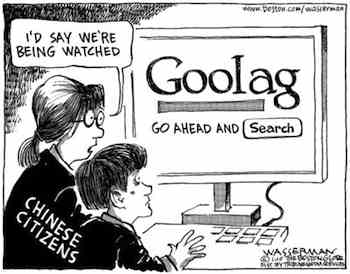- MENU
- HOME
- SEARCH
- WORLD
- MAIN
- AFRICA
- ASIA
- BALKANS
- EUROPE
- LATIN AMERICA
- MIDDLE EAST
- United Kingdom
- United States
- Argentina
- Australia
- Austria
- Benelux
- Brazil
- Canada
- China
- France
- Germany
- Greece
- Hungary
- India
- Indonesia
- Ireland
- Israel
- Italy
- Japan
- Korea
- Mexico
- New Zealand
- Pakistan
- Philippines
- Poland
- Russia
- South Africa
- Spain
- Taiwan
- Turkey
- USA
- BUSINESS
- WEALTH
- STOCKS
- TECH
- HEALTH
- LIFESTYLE
- ENTERTAINMENT
- SPORTS
- RSS
- iHaveNet.com
Alex Kingsbury

The U.S. and China argue about the role of the government in regulating the Internet
The U.S. and China argue about the role of the government in regulating the Internet
What began as a quiet post on Google's official blog has ballooned into a full fledged international tempest, with the U.S. and China trading barbs about the role of the government in regulating the Internet.
Secretary of State Hillary Clinton on Thursday condemned cyber attacks and called for an Internet where all have equal access to knowledge and ideas. "Countries that restrict free access to information or violate the basic rights of Internet users risk walling themselves off from the progress of the next century," she said.
After years of censoring Internet searches for the Chinese government, Google's patience with Beijing abruptly came to an end last week. The trigger for Google's announcement that it will stop most censorship of searches from China and may halt its business there was a sophisticated series of E-mail hacks based in China and targeting companies and human-rights activists. Some search results such as politically sensitive topics and pornography will continue to be censored as negotiations proceed with officials from the Chinese government, according to a Google official.
The decision has prompted serious examination in Washington, where for years lawmakers and civil liberties groups have decried both Chinese hackers and Google's policy of abetting communist censors in Beijing. The incident touches on several resonant issues for lawmakers, including censorship, electronic espionage, intellectual property, and human rights. The
Google, it seems, has finished making excuses for aiding the repressive Chinese regime while clinging to a corporate motto of "Don't be evil." Companies like Google and
The attack appears to have been a final straw after a tough year for Google in China. The Chinese search engine, Baidu, has swallowed up as much as two thirds of all searches, while Google is second with about a quarter of the market. Chinese state-run media have publicly accused Google of trafficking in pornography, and the government has repeatedly interfered with products like Google Documents and Gmail. With 338 million Internet users and millions more on the horizon, leaving the Chinese market would be a painful loss for Google.
U.S. lawmakers, security experts, and business leaders have denounced rampant cyberattacks launched from computers based in China and targeting Western companies. Military, intelligence, and congressional reviews have repeatedly concluded that the Chinese government is complicit in the electronic pilfering of U.S. corporate and military secrets and the infiltration of U.S. computer networks by hackers. But this particular incident, discovered in mid-December, was apparently far more sophisticated than past cases. It targeted more than 30 media, technology, chemical, finance, and defense companies, according to an initial review by Google. Whatever the future of Google's Chinese operations, it is clear that the bouts between Beijing and the West over issues like Internet freedom and hacking are only in the opening rounds.
Also: The Google Syndrome: China's Corporate Woes
WORLD NEWS & CURRENT EVENTS ...
WORLD | AFRICA | ASIA | EUROPE | LATIN AMERICA | MIDDLE EAST | UNITED STATES | ECONOMICS | EDUCATION | ENVIRONMENT | FOREIGN POLICY | POLITICS
© US News & World Report